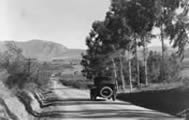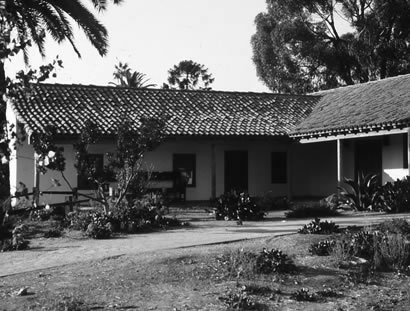|
The Machado Adobe, Old Town, San Diego.
From the San Diego Historical Society Collection.
by Albert Simonson
In the late 1850's, the first lady of the east county was Dona Ramona. She had been lured to this Indian frontier by what might be called the mother of all personal ads.
"Cockney" Bill went straight to the point. The ad said flatly, "Wife Wanted," but he tempered his direct approach with a final touch of romantic verse.
Bill was a likable English sailor, a spunky character with a notorious thirst for wine. He had survived the Battle of San Pascual, the Pauma Massacre, the Garra Indian Revolt and numerous cattle drives across the desert to Fort Yuma. He did less well at surviving loneliness at his remote mountain frontier.
Still, with the help of loyal Indians and Descanso's first settler Julian Sandoval, he managed to bring great prosperity to Rancho Valle de las Viejas y Mesa del Arroz.
His ad was as successful as our modern ads, and within a month Cockney Bill was wed to Ramona and the newspaper touted the wedding as proof of its advertising power.
Ramona came from a venerable old San Diego family, the Machados. The Machado adobe is the crown jewel of Old Town State Park. Ramona was one of four daughters of the famed "grande dame" Juana Machado de Wrightington, who left detailed memoirs as her legacy to history. All these women had a preference for Yankee suitors.
We catch our first glimpse of the charming Ramona in a flashback to an 1852 newspaper preserved at the San Diego Library. At that time, Ramona and her Yankee husband were among the first inhabitants of New Town (now downtown San Diego), where she ran a rooming house. We also catch a fleeting glimpse of the violinist ranchero whose name appears on the first deed to all land in the Dehesa-Harbison-Alpine-Viejas area, and who sold a part of it to Cockney Bill.
Of Lovelit Eyes and Palpitating Hearts.....
The big news in the San Diego Herald on May first was the gala Pacific Pioneers Ball, put on by the Yacht Club after the regatta. On all the rutted rancho roads within a hundred-mile circle, dashing rancheros astride silver-studded saddles doffed their vicuna sombreros to beauteous bailarinas, bouncing along in unsprung solid-wheeled oxcarts, all converging on Old Town.
It was 1852, and this part of the Departamento de Californias had become, "by right of conquest," the state of California, named for a banal Spanish novel about a land of mythic women who had the power to subdue and subjugate men. Some would say that they myth came true.
Officers of the Army and Navy had buffed their buttons and polished their boots. Surveyors of the Boundary Commission came in from their linear domain of rocks and rattlesnakes along the new border for a first chance to be near the softly curved Cinderellas of remote ranchos.
At eight-thirty, a band in full uniform marched through the plaza toward the ballroom, to the tune of "Come Haste to the Wedding," drawing in its wake a large crowd. At nine, the ballroom began to fill with the "fashion and beauty of San Diego," beneath flags of many nations. There, an orchestra led by "famed violinist" Don Leandro Osuna, performed beneath a black eagle of the "Dorado State."
Next morning, the Herald reporter, still flushed in the afterglow of "dark, flashing eyes and ruby lips," peppered his report with French to properly convey the mood: "The ranchos poured out their graceful Donas, who, with love-lit eyes, bounding feet and palpitating hearts might compare favorably with any community on earth. Dona Ramona was the admired of all admirers and the center of attraction to a gay coterie of officers. All was mirth, harmony and enjoyment."
Perhaps not all was mirth to "famed violinist" Don Leandro. He was more famed for patriotic fervor when his California Lancers defeated the invaders at the Battle of San Pasqual six years earlier. He had personally lanced one officer and shot another. Later, at the inevitable surrender, he had ridden up with lance extended, bearing provocatively the bloodied flag of Mexico. Haughty and tempestuous, he preferred the company of his Indian friends, and had never believed that the U. S. military forces would bring any good to his pastoral, unfenced California. And now they were dancing with Ramona and all the others.
His father had brought democracy to San Diego and had been its first mayor. His grandfather had come north with Padre Serra to establish San Diego. Yet the family's ownership of Rancho San Dieguito (now Rancho Santa Fe), a decades-old landmark, was challenged by the upstart government even though the peace treaty mandated acknowledgment of existing land titles. The future would bring more decades of title litigation. Leandro's grant of land extending from Viejas to Sycuan was likewise not confirmed. Virtually all the California rancheros were destined to lose their land, by hook or by crook. Our rigid legal structure of property rights rests on a shabby foundation.
Leandro tried to find happiness in the new California. In the end, he shot himself in the heart. Suicides occurred almost daily in California at that time. Because of his suicide, he could not be buried in the family plot at the hallowed Campo Santo of Old Town. It was long said, during restless, wind-tossed nights, that Don Leando still rides his beloved bay horse "Apache," on a silver saddle, his lance catching a glint of cold moonlight, as he searches for a familiar yesterday. His lost grave in Mission Valley has probably been disturbed, and his childhood home was incorporated into Bing Crosby's house.
Dona Ramona Machado de Curley, the "admired of all admirers" would face a blustery future, too. Her husband and his Indian friend would die in an angry surf off Coronado while hunting the last of the sea otters. Five years later, her destiny was shaped by an advertisement in the Herald, seeking a lady in whom "the graces of form to the features impart...the sweetness that lives in an innocent heart." Thus, she came to wed "Cockney" Bill Williams, a salty sailor-turned-mountain-man from London. "Cockney" Bill had bought the Viejas rancho from Don Leandro, and the newlyweds came to make their home in a two-story adobe just east of the present Viejas Casino by Brown's Road. Ramona was 26 years old.
For a time, the resourceful couple had the most productive rancho in the county, and a stage stop for the San Antonio and San Diego Mail Line, the grand daddy of all western stage lines. There were about a thousand head of cattle, sheep and hogs at the Viejas ranch, so any passengers or mule skinners who were fed up with trail beans and rancid bacon could expect rib-sticking grub from the hands of Dona Ramona.
Among Ramona's admirers were attorney and physician Dr. Hoffman, as well as civic leader Robert Israel. Both had married into her family, after succumbing to the Machado charm. It was easy to do, with only fading memories of straight-laced Yankee girls a wide continent away. Each settled in with his dark-eyed beauty and never went home again. Hoffman is credited with establishing modern medical practice in San Diego, and Israel became a central civic leader. Ramona brought both into the Viejas venture and they became a part of it.
Our back country of that time was not simply Anglo, or Indian or Hispanic. It became all of these, apparently one of those rare places where three cultures merged in tolerance and even affection. The Indians Jose Dolores, Polinario and Manuel lived in the house with Bill and Ramona and seven children. Another Indian, Aveleno, who worked the grain fields, left his precious testimony to us.
Few places in America have a local history as rich as ours. If history is a legacy to future generations, then ours is a legacy primarily of transcultural accord in a land of cultural strife. It is our duty to pass it on.
|




